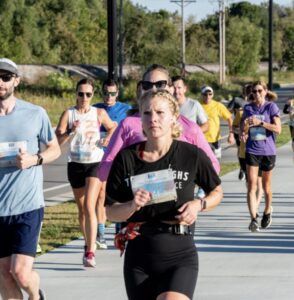Say what you will about The Biggest Loser – for real, a lot of people are saying a lot of things about it lately. And most of them aren’t great.
Thanks to a new behind-the-scenes series of interviews from people involved, The Biggest Loser is seeing new light. And it’s not the rosy, warm light of your bedroom. It’s the harsh, unforgiving fluorescent lights of an old-school department store fitting room.
The TV show once beloved for its ability to help people transform their lives crashed and burned nearly 10 years ago, aside from an attempted revival in 2020.
I watched The Biggest Loser in the middle of its heyday. It was around the time I began making healthy lifestyle choices that I desperately needed after hitting my own rock bottom. I think I loved seeing others, seemingly, achieve success; their own version of the same success I had from trading poor habits for exercise, drinking water, and eating more nutritious, real food.
But, deep down, I knew it wasn’t right. What they were doing wasn’t sustainable. And it sure as hell wasn’t a healthy approach to the most important thing we should all be seeking: overall wellness.
I knew, and I think other people came around to the fact, that weight is just one aspect of a person’s complete, well self. And extreme, unsustainable practices typically won’t lead to a long-term healthy lifestyle.

Less about the number on the scale – more about numbers that really matter, like resting heart rate.
Out of curiosity, I watched all three episodes. Overall, people didn’t say a ton of great things about it and the show did not come off well.
However, I would like to focus on the positive and talk about one thing The Biggest Loser did right. Unfortunately, it was the aspect that the show spent the least amount of time on: proof that healthy habits improve health.
How to get healthier
The Biggest Loser was, at its core, a contest. It was more of a game show than a reality show, with a six-figure prize for the person who went the most extreme and outlasted everyone else.
Like any TV show, it was hallmarked by all the sensational and sexy moments, from the painstaking workouts, to vilifying food with “temptations” and, of course, all topped off by the infamous scale. WAAAYYYY too much focus on the scale.
The show spent the least amount of time on, arguably, its true shining star: health. Improving health.
While only a blip across the entire series, there were moments the contestants stepped away from the scale and saw their true health improvements.
Many saw their blood pressure drop to normal levels. Others saw cholesterol levels move into healthy range. I recall a few who eliminated their Type 2 diabetes.
That’s right, they didn’t just kill it on the squat rack. They killed their chronic diseases.
And THAT, my friends, is what The Biggest Loser got right. It proved that when you exercise, drink water, and eat more nutritious, real foods, you CAN – and WILL – improve your health.
Your health is in your control
This is important to recognize, perhaps now more than ever.
Personal health and wellness is in a poor state in our country. There are influential voices trying to make us believe that health problems are all “just” genetic. That chronic disease “just” happens and is out of your control. This idea that you “just” can’t do much about your health.

You CAN do it.
So, what, we should “just” accept it? That’s bullshit.
Everyone is dealt a different hand but everyone can make healthy choices. In a world where there’s a lot out of our control, your health is in your control. You have power to make it better or worse.
I’m living proof of this. I’ve seen other people who are, too. Throughout all its faults, The Biggest Loser showed us this.
Healthy habits are boring – in a good way
While The Biggest Loser missed the mark in promoting it, the show’s greatest success was the most important aspect of the healthy lifestyle habits it was preaching.
Yes, exercising, drinking water, and eating nutritious food WILL improve your health and, perhaps better, quality of life.
As for the weight? I hate talking about weight. It pains me to admit, technically, yes, sure, your weight matters – but only to a degree. It’s definitely not what matters most.
Your heart and brain health, functional and mental strength, endurance and sleep, bone and joint health – those are a few examples of what matters most. And I truly believe you can be healthy and well in a variety of shapes and sizes.
Perhaps The Biggest Loser’s downfall was also why we’re still talking about it – it was a successful TV show that boomed into a profitable brand.
I get that it wouldn’t be compelling to create a TV show that teaches people habits of smart grocery shopping and nutritious cooking. Viewers may not tune in to see someone managing glucose spikes or meeting their daily fiber requirement. It wouldn’t be sexy to show people taking brisk walks every day, drinking water, and going to bed at a reasonable hour.
And that’s the funny thing: healthy lifestyle choices are incredibly boring. And I mean that in a positive, hopeful way! People seem to believe that it’s complicated to be healthy and well; that it’s a series of secrets or hacks that only the most successful people know.
A healthy lifestyle boils down to doing simple things consistently. It’s choosing water more often than soda or alcohol. It’s food prepping for the week and eating at home in favor of going out to eat or ordering Door Dash. It’s waking up and going for a walk versus immediately scrolling the phone.
Healthy habits – not made for TV…yet?
“You can’t have a show based on weight loss that’s safe.” This quote, from The Biggest Loser’s doctor and medical consultant was the one I jotted down because it stuck with me.
Maybe you can’t have a TV show that shows healthy lifestyle habits while being compelling enough to score ratings and product partnerships and all the money-making things. Maybe no one really wants to see a show that focuses on, not how much weight people lost, but what they gained in health – physical, emotional, social, all aspects of wellness. Maybe people aren’t interested in practical, lifelong habits they can put into action every day.
I mean, I’d love to watch that show – in fact, I’d like to volunteer to host that show. Maybe some day…
That’s enough for now. Until next time,
Lindsay
